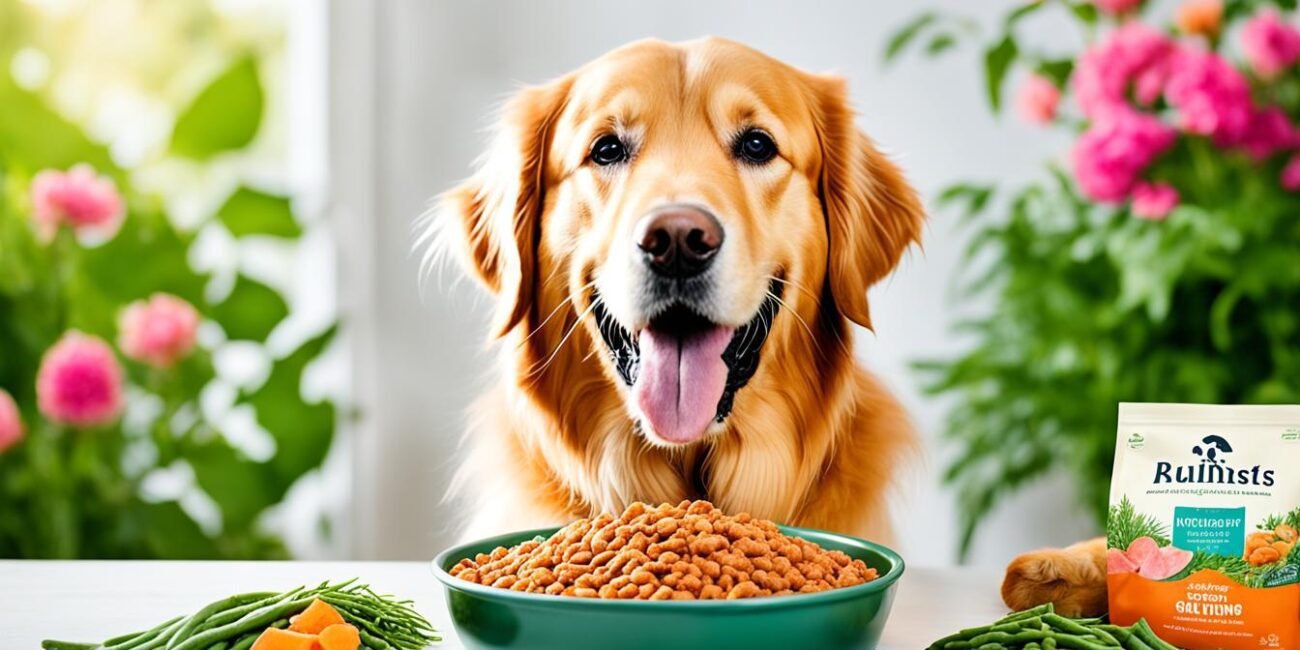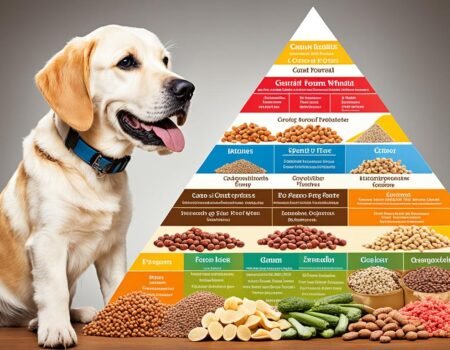Imagine the scene: it’s a beautiful sunny day, and I’m sitting in the park with my beloved dog, Max. We’ve been inseparable since the day I brought him home, his wagging tail and boundless energy bringing joy to every moment we spend together. But as the days went by, I noticed Max wasn’t his usual self. He was scratching incessantly, his skin red and irritated. My heart ached, watching him suffer.
I knew I had to find a solution to relieve Max’s allergies and bring back his playful spirit. That’s when I discovered the power of natural dog food for allergy relief. By providing him with the right nutrients, I was able to optimize his health and help him regain his vitality.
Through my own journey of trial and error, I’ve learned the importance of choosing the best dog food for allergies, tailored to Max’s unique dietary needs. Today, I want to share this knowledge with you, so that your furry friend can experience the same relief and joy that Max did.
Key Takeaways:
- Choosing natural dog food can help alleviate allergies and promote optimal health.
- Identifying food allergies in dogs is crucial for effective allergy relief.
- Consider homemade dog food recipes as a natural solution for managing allergies.
- Transitioning to a homemade dog food diet should be done gradually and with veterinary guidance.
- Additional resources, such as the American Kennel Club and Dogs Naturally Magazine, can provide valuable insights on homemade dog food and allergies.
Identifying Food Allergies in Dogs
Food allergies can cause a range of uncomfortable symptoms in dogs, including itching, red skin, and digestive issues. It’s important to identify and address these allergies to ensure your furry friend’s well-being. The most common food allergens for dogs are chicken, beef, wheat, soy, and dairy.
“Food allergies can cause a variety of symptoms in dogs, and it’s essential to understand the specific allergens affecting your pet.”
To identify food allergies, consulting with a veterinarian is crucial. They will perform a thorough examination and may recommend a dietary elimination trial or a food trial. These methods involve carefully monitoring your dog’s reaction to specific foods and gradually reintroducing potential allergens to determine the cause of the allergy.
During a dietary elimination trial, your dog will be placed on a hypoallergenic diet that avoids common allergens. If their symptoms alleviate or disappear, it suggests an underlying food allergy. As each allergen is reintroduced, any allergic reactions can confirm the specific food to avoid in the future.
Dietary Elimination Trial Process:
This process involves several steps:
- Start with a hypoallergenic diet that excludes all common allergens.
- Monitor your dog for improvements in their symptoms.
- Gradually reintroduce potential allergens one at a time.
- Pay close attention to any allergic reactions or recurrence of symptoms.
- Note and avoid the specific allergen(s) if they cause a reaction.
Common Symptoms of Food Allergies in Dogs:
The symptoms of food allergies in dogs can vary, but they often include:
- Itching and scratching
- Red or inflamed skin
- Chronic ear infections
- Vomiting or diarrhea
- Excessive licking or biting of paws
Identifying food allergies in dogs is an important step in providing them with the necessary relief and improving their overall health. By working closely with your veterinarian and conducting an elimination trial, you can pinpoint the specific allergens to avoid and ensure your dog’s well-being.
Choosing the Best Dog Food for Allergies
When it comes to selecting the best dog food for allergies, it’s crucial to consider your furry friend’s specific dietary needs. By understanding common allergens and focusing on high-quality ingredients, you can provide relief from allergies and improve your dog’s overall health.
Avoid Common Allergens:
To alleviate your dog’s allergies, it is essential to steer clear of common allergens such as wheat gluten and soy. These ingredients can trigger allergic reactions and worsen your dog’s symptoms. Instead, opt for dog foods that are free from these allergens to provide relief and support your dog’s well-being.
Look for High-Quality Protein Sources:
The first ingredient in your dog’s food should be a high-quality protein source. This ensures that your dog receives essential amino acids and nutrients necessary for optimal health. Look for specific protein sources like chicken, beef, or fish that are easily digestible and less likely to cause allergic reactions.
Consider Limited Ingredient Diets and Novel Protein Sources:
For dogs with allergies, limited ingredient diets (LIDs) can be beneficial. These diets contain a smaller number of ingredients, reducing the chances of triggering an allergic reaction. Additionally, novel protein sources such as venison or duck can be introduced to provide variety and lower the risk of allergies.
Explore Hypoallergenic and Grain-Free Options:
If your dog suffers from severe allergies, hypoallergenic and grain-free dog foods can be a suitable choice. These options are specially formulated to minimize allergic reactions and offer relief from symptoms. Hypoallergenic dog foods typically contain hydrolyzed proteins, which have been broken down into smaller molecules, making them less likely to cause an immune response.
A Visual Representation of Choosing the Best Dog Food for Allergies:
| Factors to Consider | Examples |
|---|---|
| Avoid Common Allergens |
|
| High-Quality Protein Sources |
|
| Limited Ingredient Diets |
|
| Hypoallergenic and Grain-Free Options |
|
Image related to choosing the best dog food for allergies:
By carefully selecting the best dog food for allergies, you can provide relief for your pet and help them lead a healthier, happier life. Remember to consult with your veterinarian for personalized recommendations based on your dog’s specific needs.
Homemade Dog Food Recipes for Allergies
If your dog suffers from allergies, homemade dog food can be a natural and customizable solution. By preparing your own dog food, you have full control over the ingredients and can cater to your dog’s specific needs. Consider trying these homemade dog food recipes that are designed to provide relief from allergies while promoting a healthy skin and coat:
Turkey and Sweet Potato Delight
An excellent choice for dogs with allergies, this recipe combines lean turkey and easily digestible sweet potatoes. Turkey is a lean protein source that offers essential amino acids for muscle development, while sweet potatoes are rich in vitamins and antioxidants that support a healthy immune system.
Salmon and Quinoa Medley
Salmon is packed with omega-3 fatty acids, which have anti-inflammatory properties that can help soothe allergies and improve skin health. Quinoa, a gluten-free grain, provides additional protein and fiber to support digestion. This recipe is not only nutritious but also delicious for your furry friend.
Beef and Pumpkin Stew
Beef is a high-quality protein source that can be beneficial for dogs with allergies, and pumpkin is known for its digestive benefits and its ability to soothe irritated skin. This stew is not only flavorful but also packed with essential nutrients that can help alleviate allergy symptoms.
When preparing homemade dog food, it’s important to ensure a balanced diet that meets your dog’s nutritional needs. Consult with your veterinarian to determine the appropriate portion sizes and any necessary supplements to include in your homemade dog food recipes.
| Recipe | Main Ingredients | Benefits |
|---|---|---|
| Turkey and Sweet Potato Delight | Lean turkey, sweet potatoes | Lean protein, vitamins, antioxidants |
| Salmon and Quinoa Medley | Salmon, quinoa | Omega-3 fatty acids, protein, fiber |
| Beef and Pumpkin Stew | Beef, pumpkin | High-quality protein, digestive benefits |
By incorporating these homemade dog food recipes into your dog’s diet, you can provide relief from allergies while ensuring they receive the necessary nutrients for overall health and well-being. Remember to introduce new recipes gradually and monitor your dog for any adverse reactions. A homemade diet tailored to their specific needs can make a significant difference in managing their allergies and promoting optimal health.
The Benefits of Homemade Dog Food for Allergies
When it comes to providing relief for your furry friend’s allergies, homemade dog food can be a game-changer. By eliminating potential allergens found in commercial foods and allowing for customization, homemade dog food offers several benefits that can greatly improve your dog’s overall well-being.
1. Allergen elimination:
One of the key advantages of homemade dog food is the ability to eliminate potential allergens. Commercial dog foods often contain common allergens like wheat, soy, and artificial additives that can trigger allergic reactions in sensitive dogs. By preparing homemade meals, you have full control over the ingredients, ensuring that only safe and hypoallergenic options are included.
2. Customization for specific needs:
Every dog is unique, and their allergies may vary. Homemade dog food allows you to tailor the meals to meet your dog’s specific needs. If your dog is allergic to certain proteins, such as chicken or beef, you can opt for alternative protein sources like fish or turkey. Ingredients like sweet potato, fish oil, and lean proteins can support a healthier immune system and reduce allergic reactions.
3. Improved overall well-being:
By providing your dog with homemade dog food, you can enhance their overall well-being. Commercial dog foods may lack the necessary nutrients and antioxidants to support optimal health. Homemade meals, on the other hand, can be packed with wholesome ingredients that provide essential vitamins, minerals, and antioxidants. This can contribute to healthier skin, a shinier coat, increased energy, and improved digestion.
“Homemade dog food allows for allergen elimination, customization to meet specific needs, and improved overall well-being.”
By taking the time to prepare homemade meals for your dog, you can provide them with the best possible nutrition to alleviate allergies and promote a healthier, happier life.
Best Commercial Dog Foods for Allergies
When it comes to addressing allergies in dogs, there are several commercial dog foods on the market that can provide the necessary relief. These foods are specially formulated to meet your dog’s nutritional needs while managing their allergies effectively. Here are three reputable brands that offer some of the best commercial dog foods for allergies:
1. Instinct
Instinct is a well-known brand that offers a variety of hypoallergenic dog food options. Their recipes are made with high-quality ingredients and are free from common allergens such as wheat, soy, and dairy. Instinct’s limited ingredient diets are designed to promote optimal health and address food sensitivities, making them an excellent choice for dogs with allergies.
2. ACANA
ACANA is another brand that prioritizes the nutritional needs of dogs with allergies. Their hypoallergenic dog food recipes feature a limited number of ingredients, making it easier to identify and manage potential allergens. ACANA’s high-quality proteins and grain-free formulations can help alleviate allergy symptoms and improve your dog’s overall well-being.
3. Merrick
Merrick offers a range of hypoallergenic dog foods that provide balanced nutrition while addressing food allergies. Their recipes include novel protein sources like duck, venison, and salmon, which are less likely to cause allergic reactions in dogs. Merrick’s grain-free options and commitment to using real, whole ingredients make them a trusted choice for dogs with allergies.
When choosing the best commercial dog food for allergies, it’s essential to read ingredient labels carefully and consult with your veterinarian to ensure the food meets your dog’s specific dietary requirements. Remember to introduce any new food gradually, monitoring your dog’s response to ensure it agrees with their system.
In addition to commercial dog foods, there are also homemade dog food recipes that can be tailored to address allergies. These recipes allow for greater control over the ingredients and can be a viable alternative for dogs with severe allergies or specific dietary restrictions.
Transitioning to a Homemade Dog Food Diet
When it comes to transitioning your dog to a homemade diet, it’s important to approach it with caution and care. Abrupt changes to their diet can lead to digestive upsets and discomfort. To ensure a smooth and successful transition, follow these steps:
- Start slow: Begin by gradually introducing small amounts of homemade dog food alongside their current diet. This allows your dog’s digestive system to adjust and reduces the likelihood of any adverse reactions.
- Monitor their response: Keep a close eye on your dog’s reaction to the new diet. Look for signs of improved health, such as a shinier coat or increased energy levels, as well as any potential allergic reactions or digestive issues.
- Make gradual adjustments: As you continue the transition, you may need to make adjustments to the homemade dog food recipe to better meet your dog’s specific needs. Consult with your veterinarian for guidance and to address any concerns related to allergies or skin conditions.
Remember, each dog is unique, and what works for one may not work for another. It’s essential to customize your dog’s homemade diet based on their individual needs and nutritional requirements. Regular check-ups and communication with your veterinarian are crucial to ensuring your dog’s health and well-being.
Expert Tip:
“As you transition your dog to a homemade diet, pay attention to any changes in their overall health and behavior. This will help you identify whether the new diet is meeting their nutritional needs effectively.”
| Advantages of Transitioning to Homemade Dog Food | Disadvantages of Transitioning to Homemade Dog Food |
|---|---|
| 1. Customization based on specific nutritional needs. | 1. Requires time and effort for recipe preparation. |
| 2. Avoidance of potential allergens present in commercial foods. | 2. May lead to nutritional imbalances if not properly formulated. |
| 3. Enhanced control over ingredients and quality of food. | 3. Lack of convenience compared to store-bought options. |
| 4. Potential for improved digestion and reduced allergies. | 4. Costly, especially if sourcing high-quality ingredients. |
Additional Resources for Homemade Dog Food and Allergies
Allergies can be a challenging issue to address when it comes to your dog’s diet. Fortunately, there are valuable resources available to help you navigate the world of homemade dog food and manage allergies effectively.
The American Kennel Club (AKC) is a trusted authority on all things dog-related. Their website offers a wealth of information on dog nutrition, including articles, guides, and expert advice. You can rely on the AKC to provide reliable and up-to-date resources to help you create homemade dog food recipes that cater to your dog’s specific dietary needs.
“The American Kennel Club provides reliable and up-to-date resources to help you create homemade dog food recipes.”
Dogs Naturally Magazine is another valuable resource for dog owners concerned about allergies and homemade dog food. Their website is filled with informative articles that cover a wide range of topics related to dog nutrition, including homemade dog food recipes, natural remedies for allergies, and tips for managing food sensitivities. Dogs Naturally Magazine is dedicated to promoting holistic and natural approaches to dog care, making it a go-to resource for dog owners seeking alternative solutions for their pet’s health.
Whole Dog Journal is a comprehensive resource that covers various aspects of dog care, including nutrition, health, and training. Their website is home to a treasure trove of articles, guides, and expert advice on homemade dog food and managing allergies. With a focus on well-rounded and balanced approaches to dog care, Whole Dog Journal provides valuable insights that can help you optimize your dog’s diet to alleviate allergies and promote overall health.
By utilizing these additional resources, you can enhance your knowledge of homemade dog food and allergies, ensuring that you are equipped with the necessary information to make informed decisions about your dog’s diet.
With the guidance of trusted sources like the American Kennel Club, Dogs Naturally Magazine, and Whole Dog Journal, you can confidently provide your dog with wholesome, homemade meals that are tailored to their specific needs.
Conclusion
In conclusion, natural dog food can play a crucial role in providing relief from allergies and promoting optimal health for your furry friend. By opting for homemade dog food recipes or carefully selecting commercial options, you can avoid common allergens and customize your dog’s diet to meet their specific needs. This can lead to a reduction in itching, improved skin health, and an overall happier and healthier dog.
When preparing homemade dog food, it’s important to choose high-quality ingredients like lean proteins, fruits, and vegetables. This ensures that your dog receives the necessary nutrients while avoiding potential allergens. Consulting with your veterinarian during the transition process is vital to ensure that your dog’s nutritional requirements are met and any specific allergy concerns are addressed.
For those who prefer commercial dog food, there are various brands available that offer hypoallergenic options. Brands like Instinct, ACANA, and Merrick are known for their high-quality ingredients and targeted formulations that cater to dogs with allergies. These commercially prepared options can provide a convenient and effective way to manage your dog’s allergies while still providing them with the necessary nutrition.
In summary, whether you choose to prepare homemade dog food or opt for commercial options, the key is to prioritize your dog’s health and well-being. By selecting natural dog food for allergy relief, you can address their specific dietary needs, alleviate allergies, and support their overall health and happiness.
FAQ
What are common food allergens for dogs?
Common food allergens for dogs include chicken, beef, wheat, soy, and dairy.
How can I determine if my dog has a food allergy?
It’s important to consult with a veterinarian to determine if your dog has a food allergy and conduct a dietary elimination trial or food trial to identify the specific allergens.
What should I look for when selecting dog food for allergies?
When selecting dog food for allergies, it’s important to avoid common allergens like wheat gluten and soy. Look for high-quality protein sources as the first ingredient. Limited ingredient diets and novel protein sources can be beneficial for dogs with allergies. Consider hypoallergenic and grain-free options to provide relief from allergies and improve your dog’s overall health.
Can homemade dog food help with allergies?
Homemade dog food can offer a natural solution for dogs with allergies. There are numerous recipes that can be customized to address your dog’s specific needs. Recipes such as Turkey and Sweet Potato Delight, Salmon and Quinoa Medley, and Beef and Pumpkin Stew can provide relief from allergies and promote healthy skin and coat.
What are the benefits of homemade dog food for allergies?
Homemade dog food eliminates potential allergens found in commercial foods and allows for customization to meet your dog’s specific needs. It can support a healthier immune system, reduce allergic reactions, and improve overall well-being. By using ingredients like sweet potato, fish oil, and lean proteins, you can provide optimal nutrition for your dog’s allergies.
Are there commercial dog foods available for allergies?
Yes, several commercial dog foods are specifically formulated to address allergies. Brands like Instinct, ACANA, and Merrick offer hypoallergenic options made with high-quality ingredients. These foods are designed to meet your dog’s nutritional needs while managing allergies and promoting optimal health.
How do I transition my dog to a homemade diet?
Transitioning your dog to a homemade diet should be done gradually to prevent digestive upsets. Monitor your dog’s response to the new diet and make adjustments as needed. Consult with your veterinarian to ensure your dog’s nutritional needs are being met and to address any specific concerns related to allergies or skin conditions.
Where can I find additional resources for homemade dog food and allergies?
The American Kennel Club, Dogs Naturally Magazine, and Whole Dog Journal are valuable resources for dog owners looking for more information on homemade dog food and allergies. These sources provide articles, guides, and recipes to help you provide the best nutrition for your dog and manage allergies effectively.










No Comment! Be the first one.